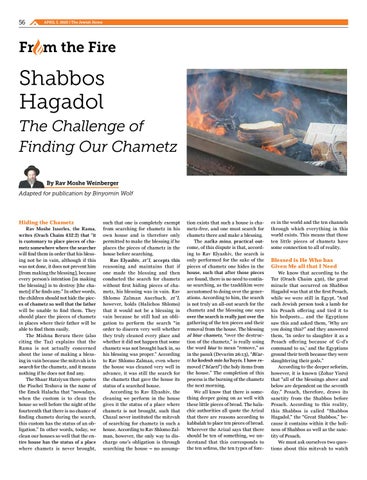70 56
OCTOBER 29, 2015 The Jewish Home APRIL 3, 2020 | The |Jewish Home
From the Fire
Shabbos Hagadol The Challenge of Finding Our Chametz By Rav Moshe Weinberger Adapted for publication by Binyomin Wolf
Hiding the Chametz Rav Moshe Isserles, the Rama, writes (Orach Chaim 432:2) that “it is customary to place pieces of chametz somewhere where the searcher will find them in order that his blessing not be in vain, although if this was not done, it does not prevent him [from making the blessing], because every person’s intention [in making the blessing] is to destroy [the chametz] if he finds any.” In other words, the children should not hide the pieces of chametz so well that the father will be unable to find them. They should place the pieces of chametz in places where their father will be able to find them easily. The Mishna Berura there (also citing the Taz) explains that the Rama is not actually concerned about the issue of making a blessing in vain because the mitzvah is to search for the chametz, and it means nothing if he does not find any. The Shaar Hatziyun there quotes the Pischei Teshuva in the name of the Emek Halacha that “nowadays, when the custom is to clean the house so well before the night of the fourteenth that there is no chance of finding chametz during the search, this custom has the status of an obligation.” In other words, today, we clean our houses so well that the entire house has the status of a place where chametz is never brought,
such that one is completely exempt from searching for chametz in his own house and is therefore only permitted to make the blessing if he places the pieces of chametz in the house before searching. Rav Elyashiv, zt”l, accepts this reasoning and maintains that if one made the blessing and then conducted the search for chametz without first hiding pieces of chametz, his blessing was in vain. Rav Shlomo Zalman Auerbach, zt”l, however, holds (Halichos Shlomo) that it would not be a blessing in vain because he still had an obligation to perform the search “in order to discern very well whether they truly cleaned every place and whether it did not happen that some chametz was not brought back in, so his blessing was proper.” According to Rav Shlomo Zalman, even where the house was cleaned very well in advance, it was still the search for the chametz that gave the house its status of a searched house. According to Rav Elyashiv, the cleaning we perform in the house gives it the status of a place where chametz is not brought, such that Chazal never instituted the mitzvah of searching for chametz in such a house. According to Rav Shlomo Zalman, however, the only way to discharge one’s obligation is through searching the house – no assump-
tion exists that such a house is chametz-free, and one must search for chametz there and make a blessing. The nafka mina, practical outcome, of this dispute is that, according to Rav Elyashiv, the search is only performed for the sake of the pieces of chametz one hides in the house, such that after those pieces are found, there is no need to continue searching, as the tzaddikim were accustomed to doing over the generations. According to him, the search is not truly an all-out search for the chametz and the blessing one says over the search is really just over the gathering of the ten pieces and their removal from the house. The blessing al biur chametz, “over the destruction of the chametz,” is really using the word biur to mean “remove,” as in the pasuk (Devarim 26:13), “Bi’arti ha’kodesh min ha’bayis, I have removed (“bi’arti”) the holy items from the house.” The completion of this process is the burning of the chametz the next morning. We all know that there is something deeper going on as well with these little pieces of bread. The halachic authorities all quote the Arizal that there are reasons according to kabbalah to place ten pieces of bread. Wherever the Arizal says that there should be ten of something, we understand that this corresponds to the ten sefiros, the ten types of forc-
es in the world and the ten channels through which everything in this world exists. This means that these ten little pieces of chametz have some connection to all of reality.
Blessed is He Who has Given Me all that I Need We know that according to the Tur (Orach Chaim 430), the great miracle that occurred on Shabbos Hagadol was that at the first Pesach, while we were still in Egypt, “And each Jewish person took a lamb for his Pesach offering and tied it to his bedposts... and the Egyptians saw this and asked them, ‘Why are you doing this?” and they answered them, ‘In order to slaughter it as a Pesach offering because of G-d’s command to us,’ and the Egyptians ground their teeth because they were slaughtering their gods.” According to the deeper seforim, however, it is known (Zohar Yisro) that “all of the blessings above and below are dependent on the seventh day.” Pesach, therefore, draws its sanctity from the Shabbos before Pesach. According to this reality, this Shabbos is called “Shabbos Hagadol,” the “Great Shabbos,” because it contains within it the holiness of Shabbos as well as the sanctity of Pesach. We must ask ourselves two questions about this mitzvah to watch





















